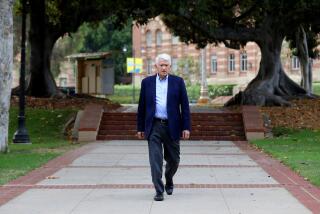Reprimand of Cal State Fullerton math professor in textbook dispute stands
- Share via
Cal State Fullerton math professor Alain Bourget has been fighting to have a reprimand overturned after defying his department’s choice for a classroom textbook.
But on Thursday, campus President Mildred Garcia announced that she had denied Bourget’s grievance and that the letter of reprimand would stand.
Her decision came after a faculty panel who heard Bourget’s case said earlier in the day that it could not reach a conclusion and recommended that the matter be heard in a “more appropriate venue.”
Garcia had up to three weeks to consider the outcome. In a short letter addressed to Bourget, she said that he had not met the burden of proof.
“The committee in its letter included arguments that were in my favor, so I’m very disappointed that the president decided to ignore that and use the fact that they couldn’t come up with a decision to let the reprimand stand,” Bourget said.
Bourget said he is considering other options, including arbitration and a possible lawsuit.
The panel in its decision noted that Bourget had violated some academic guidelines when he went ahead and ordered a different, cheaper textbook for his advanced algebra class, despite his understanding that the department wanted all faculty to use a common book for the course.
But the three-member committee seemed to find more fault with the math department for having no established process for switching textbooks and said that voicing an honest opinion about changing books would have been awkward given that the department chairman and vice chairman were the co-authors of the textbook being used.
“The lack of a policy or mechanism for considering textbook change, coupled with the fact that the department leadership authored the text, created a situation wherein making a change was likely quite difficult,” said the decision written by hearing panel chairwoman Carol Lundberg.
The letter was addressed to Bourget and Garcia, who had ultimate authority over the outcome.
The campus Academic Senate is convening a committee to consider overall policies on textbook use. No timetable was set for its report.
Bourget’s case not only divided the math department but has ignited debate nationwide over issues of academic freedom, textbook costs and whether it is a conflict of interest for department leaders to assign their own books widely.
The book in question, “Differential Equations and Linear Algebra,” was written by department heads Stephen W. Goode and Scott A. Annin and had been used in different version for 25 years. A new copy costs $180 in the campus bookstore, but it can also be rented and bought online for less.
Officials argued that a common department selection should be used when multiple sections of the same course are taught by different instructors.
Bourget, though, said he found cheaper course materials that were more relevant for the math 250B class he taught in spring 2014 and argued there was no clear policy on changing books.
Annin and Goode did not return a request for comment. David Bowman, interim dean of the College of Natural Sciences and Mathematics, who issued the reprimand, also did not return a request for comment.
Bourget has received wide support from faculty and students across the country, including a petition signed by 70 Fullerton faculty members.
But most of his math colleagues said they support the department in this case.
“Dr. Goode and Dr. Annin have been accused of coercing the department into using their text. This is ludicrous; in fact, the opposite is the case. In philosophy, action, and in words, they have made it clear that if we can identify a superior text to theirs, the department should adopt it. Clearly, that has not happened,” said a Nov. 3 letter signed by 36 math faculty and addressed to the Academic Senate and campus community.
The Bourget case is also being closely watched by proponents of free online course materials who say academic departments have been slow to adapt to new technology and update their methods of choosing textbooks.
“Ten years ago, collective adoptions saved students money, so it’s an interesting situation that the technology to solve this problem has moved much faster,” said Nicole Allen, director of open education for the Scholarly Publishing and Academic Resources Coalition. “Departments should be asking, ‘What is the right book?’ and ‘Is making a collective decision helping students?’” This case is significant because we’ve gotten to ask those questions.”
Twitter: @carlariveralat
More to Read
Sign up for Essential California
The most important California stories and recommendations in your inbox every morning.
You may occasionally receive promotional content from the Los Angeles Times.











